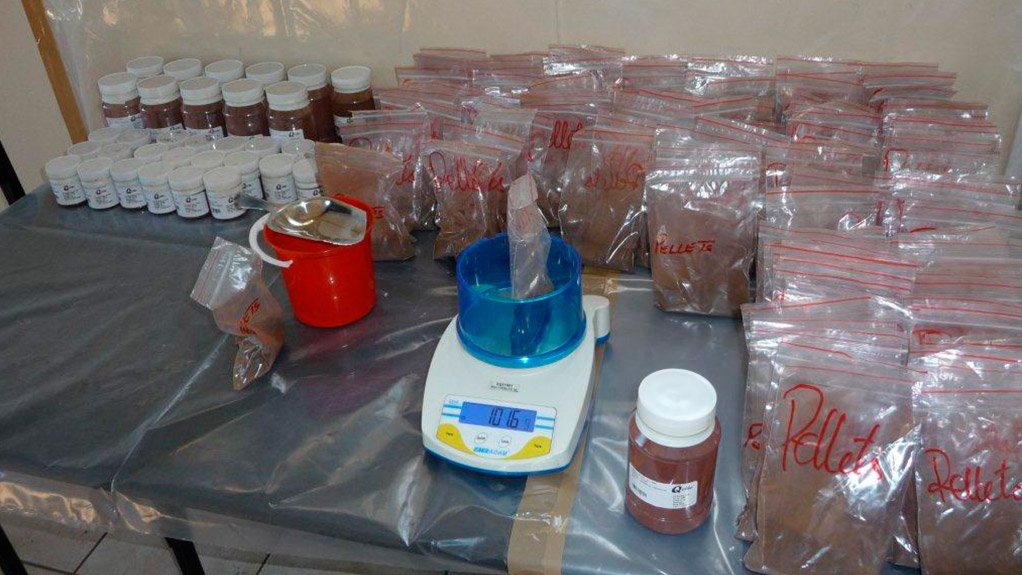New PT scheme for African iron-ore industry


QUALITY IMPERATIVE Qotho Laboratory Services’ iron-ore proficiency testing schemes include quality testing of materials to ensure international standards compliance
Recognising a niche in the iron-ore sector for a formal and independent iron-ore proficiency testing scheme, mining laboratory quality-control services provider Qotho Laboratory Services launched its iron-ore interlaboratory proficiency testing (PT) scheme for the industry last month, technical director Nhlanhla Mamba tells Mining Weekly.
Qotho is a subsidiary of mining laboratory design and consulting firm Tramecon and provides interlaboratory PT schemes for different minerals and commodities such as copper, manganese and chrome. Current participants include global resources company BHP Billiton, active in South Africa’s Northern Cape; Johannesburg-based testing services company Intertek SA; Phalaborwa Copper Mine and African Copper Mine, in Botswana; technical services company Alfred H Knight (Zambia); and mining company African Mineral Resources’ Nkomati mine, in South Africa, and its Lubambe copper mine in Zambia.
“Qotho offers this tool to accredited and nonaccredited iron-ore laboratories, as we believe that laboratories’ adherence to the quality assurance system is an imperative,” Mamba says, adding that the aim of Qotho’s PT schemes is to independently interpret data submitted beyond pure statistical analysis.
Ten participants, comprising commercial and in-house mining laboratories from South Africa, Zimbabwe and the Democratic Republic of Congo, will participate this month in the first round of the iron-ore PT schemes.
The iron-ore PT scheme runs every two months (a round) and focuses on iron-ore analysis, including parameter analysis of silica, calcium oxide, magnesium oxide, phosphorus, aluminium oxide and manganese, as well as the specific gravity contents of iron-ore.
Qotho samples include fines and lumpy iron-ore, categorized as high-grade iron-ore, which has an inherent iron content of 63% or more; medium-grade iron-ore , which has an iron content of 55% to 63%; and low-grade or exploration-grade iron-ore, which has an iron content of between 20% and 47%.
During each round, participants receive homogeneous samples and have to report their results within four weeks, after which the results of all partakers undergo statistical analysis which are handled anonymously.
Benchmarking Tool
“Owing to the paramount importance of product quality, the scheme is relevant to the South African iron-ore industry, as all the local producers export to global markets and are, therefore, subject to stringent international standards,” Mamba emphasises.
One of the challenges facing the iron-ore sector is to confirm that product quality on exports is always met, to ensure that contracted prices are achieved. Should product quality fail, the material will be downgraded, which could result in a significant loss of revenue.
“There is, therefore, a need for quality PT schemes, such as Qotho PT, to enable local laboratories to benchmark themselves against their international counterparts,” Mamba explains.
He points out that the PT schemes assist laboratories to improve their performance and demonstrate their competencies to accreditation bodies or customers.
Further, by acquiring certificates of participation, commercial and internal laboratories can confidently defend their analytical ability by providing proof of how they benchmark themselves against other laboratories, Mamba notes.
“In addition to stringent internal quality checks and the use of certified reference standards, regular participation in PT schemes verifies the analytical competence of a laboratory,” Mamba adds.
Another advantage of the testing schemes is that they provide “a more realistic assessment” of a laboratory’s overall performance, including aspects such as sample reception and the appropriateness of analytical procedures and reporting.
“It also effectively identifies instrumental drift, calibration failure, reagent contamination, or consistent operator errors,” says Mamba.
Other problems likely to be identified include measurement bias, incorrect sample identification, transcript errors in results and errors that occur when handling individual samples.
Independent Alternative
Laboratories in the iron-ore sector participate in round robins, which are testing schemes organised on a voluntary basis by a group of laboratories, notes Mamba.
“In-house” round robins are, however, not guaranteed to be independent and, further, do not guarantee anonymity or confidentiality, which can create bias and foster defensiveness amongst participants, says Mamba.
“The formal Qotho iron-ore PT scheme will promote harmony within participating laboratories by ensuring confidentiality, producing comprehensive PT reports that can be understood by a statistical layman, and provide objective evaluation of the quality of the laboratory performance, clearly identifying areas for improvement in the lab quality system,” he stresses.
Qotho, therefore, aspires to break into the iron-ore industry across Africa, facilitating formal, independent and anonymous PT schemes on the continent, Mamba adds.
“Nevertheless, Qotho’s PT schemes should not be seen as a competitor to round robin schemes or informal interlaboratory comparison programmes, but rather as an independent benchmarking tool,” he emphasises, adding that he expects a “welcoming” market reaction to the schemes.
Comments
Press Office
Announcements
What's On
Subscribe to improve your user experience...
Option 1 (equivalent of R125 a month):
Receive a weekly copy of Creamer Media's Engineering News & Mining Weekly magazine
(print copy for those in South Africa and e-magazine for those outside of South Africa)
Receive daily email newsletters
Access to full search results
Access archive of magazine back copies
Access to Projects in Progress
Access to ONE Research Report of your choice in PDF format
Option 2 (equivalent of R375 a month):
All benefits from Option 1
PLUS
Access to Creamer Media's Research Channel Africa for ALL Research Reports, in PDF format, on various industrial and mining sectors
including Electricity; Water; Energy Transition; Hydrogen; Roads, Rail and Ports; Coal; Gold; Platinum; Battery Metals; etc.
Already a subscriber?
Forgotten your password?
Receive weekly copy of Creamer Media's Engineering News & Mining Weekly magazine (print copy for those in South Africa and e-magazine for those outside of South Africa)
➕
Recieve daily email newsletters
➕
Access to full search results
➕
Access archive of magazine back copies
➕
Access to Projects in Progress
➕
Access to ONE Research Report of your choice in PDF format
RESEARCH CHANNEL AFRICA
R4500 (equivalent of R375 a month)
SUBSCRIBEAll benefits from Option 1
➕
Access to Creamer Media's Research Channel Africa for ALL Research Reports on various industrial and mining sectors, in PDF format, including on:
Electricity
➕
Water
➕
Energy Transition
➕
Hydrogen
➕
Roads, Rail and Ports
➕
Coal
➕
Gold
➕
Platinum
➕
Battery Metals
➕
etc.
Receive all benefits from Option 1 or Option 2 delivered to numerous people at your company
➕
Multiple User names and Passwords for simultaneous log-ins
➕
Intranet integration access to all in your organisation



















